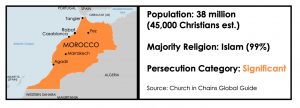
The Kingdom of Morocco is a relatively moderate Sunni Muslim country ruled by the widely-respected King Mohammad VI. After protests in 2011 linked to the Arab Spring, a revised constitution was introduced which diluted some of the king’s powers and was broadly welcomed. In the general election of 2021, the victory of liberal parties led to optimism among Christians for greater freedom.
King Mohammad VI supported the widely-welcomed 2016 Marrakesh Declaration, a statement by more than 250 Muslim religious leaders, heads of state and scholars that defends the rights of religious minorities in predominantly Muslim countries.
Christians in Morocco
Morocco’s Christian community is growing, despite some repression. The Christian population is estimated to comprise around 40,000 expatriates and from 4,000 to 12,000 Moroccans, many of whom are ethnic Berber. Expatriate Christians enjoy considerable freedom, provided they do not evangelise, and are permitted to attend legally-registered churches but services are monitored to check that no Moroccans attend and any foreign Christian accused of proselytism can be deported.
Morocco’s constitution provides for freedom to practise one’s religion but its penal code states that “anyone who employs incitement to shake the faith of a Muslim or to convert them to another religion” can be imprisoned for six months to three years and fined. This includes distributing Christian materials and discussing the gospel with an intention to persuade. However, the New Testament has been translated into Moroccan Arabic and an Old Testament translation is underway.
Moroccan-born Christians can only meet in small, secret house churches and while most are left alone by the authorities, police do harass, arrest and interrogate some individuals and groups. Christian converts are considered apostates and experience ostracism and occasional violence from family and community. They also face denial of inheritance rights and marriage rights and even removal of child custody. In a significant move, however, in 2017 Morocco’s highest religious authority, the High Religious Committee presided over by the King, stated that converts from Islam should no longer face the death penalty for apostasy.
Foreign Christian aid workers expelled
A severe crackdown on Christians initiated by two government ministers (for Justice and Interior) was launched in 2010. The first major sign of this crackdown was a raid on a home group in February 2010, when 18 people including children were arrested and property was confiscated. Many other Moroccan Christians were subsequently taken in for police interrogation.
Foreign missionaries were expelled on the grounds of contravening the Penal Code regarding proselytism, or on grounds of “threat to public order“. Between March and July 2010 around 128 foreign Christians were deported, many of them aid workers. A media campaign at the time vilified foreign Christians and a Facebook campaign targeted and endangered Moroccan Christians.
In April 2010, nearly 7,000 Muslim leaders signed a document describing the work of Christians in Morocco as “moral rape” and “religious terrorism“.
(Barnabas Fund, Church in Chains Global Guide, Compass Direct, Middle East Concern)
